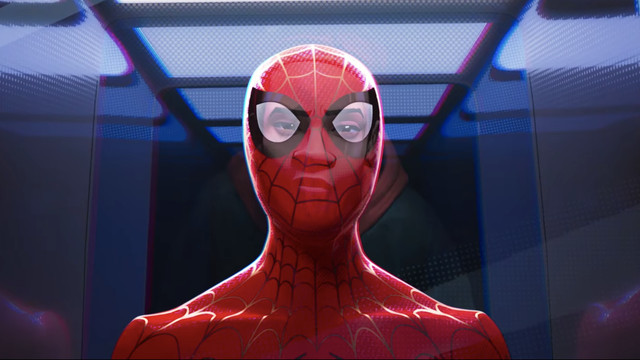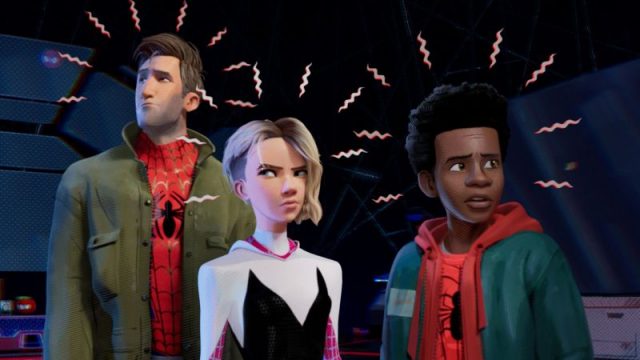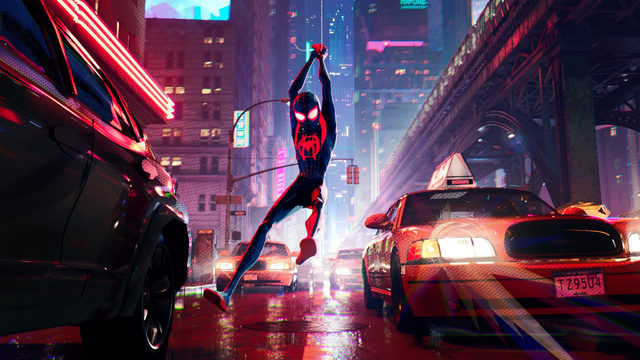Walking out of Spider-Man: Into the Spider-Verse, it’s hard to escape the feeling that it was something extremely special. In a year filled with groundbreaking superhero milestones, this film fittingly tops the cake. This may even be one of the most important films of the decade when all is said and done. In many ways, Into the Spider-Verse is emblematic of how far the genre has come in the past ten years. More importantly, it’s also proof that we’ve only hit the tip of the iceberg in terms of new, fresh, and engaging comic book stories that can be told on the big screen.
Aside from successfully introducing Miles Morales to casual comic book movie fans, the film also breaks the doors wide open for the cinematic potential of a Spider-Man multiverse. The basic idea behind Into the Spider-Verse could have been a tricky sell for audiences. Despite being a well-known element of Spider-Man lore for years, Into the Spider-Verse has a potentially confusing concept for general audiences to grasp. It’s a wild premise that could have easily backfired, especially because the average person is so used to Peter Parker as the singular Spider-Man. Luckily, the core idea of the Spider-Verse is ultimately made extremely palatable through smart writing, groundbreaking animation, and engrossing storytelling.

Written by Phil Lord and Rodney Rothman from a story by Lord, Into the Spider-Verse features a surprisingly deep screenplay. The film’s ambitions are obvious from the start, and Into the Spider-Verse is an extremely dense experience. However, it always remembers the fact that it’s a Miles Morales story at its core. Since his debut in 2011, Miles has quickly become one of Marvel’s most important characters. While the filmmakers certainly recognize this, they also prove why Miles deserves to have a big screen presence going forward. Into the Spider Verse features clear set-ups and pay-offs, consequences, and there’s even a shocking amount of dramatic weight.
Thematically speaking, one of the many questions that the film asks is what it actually means to be Spider-Man. Using Miles as a cypher; Into the Spider-Verse explores the notion that anyone has the ability to be extraordinary, no matter what their personal experience. The idea that anyone can be Spider-Man is a powerful one, especially for children. Both Peter and Miles are just normal people trying to survive, which makes both of their respective journeys even more relatable. What’s fascinating about Into the Spider-Verse is that if the various Spider-Men and Spider-Women were removed, Miles’ story wouldn’t have felt as significant. Miles can certainly stand alone as a character, but it’s interesting how the inclusion of such different perspectives so effectively shape his thematic evolution.

With three different directors at the helm, this movie could have easily been an inconsistent mess. Instead the opposite is true. Directors Bob Persichetti, Peter Ramsey, and Rothman each lent their perspective to the film, and it’s clear that the symbiotic dynamic between the trio is one of the reasons it feels so layered. Somehow, all of the ideas in the film coalesce without losing the individual touches, making for a wholly unique experience. The action scenes are equally as inventive, with major sequences at the end of the first and second acts that are each particularly distinctive in their own right. Tonally speaking, the movie successfully threads a fine line between comedy and drama. Although the inherent stakes of the story are never discounted, the movie also never takes itself too seriously.
While Shameik Moore’s ridiculously honest interpretation of Miles is easily the highlight of the movie, Jake Johnson’s portrayal of Peter Parker is equally as affecting. By making this rendition of Peter an older, more jaded version of the character, the film allows itself to explore what might happen to Peter after decades of being Spider-Man. Peter has never been depicted through the lens of a mid-life crisis before, which adds a tragic new dynamic to his character. Despite Peter’s decades of experience, he has as much to learn as Miles, which makes for an intriguing on-screen relationship between the two. Although the rest of the voice cast is great, Nicholas Cage’s short, but sweet, performance as Spider-Man Noir is one of the most inspired casting choices.

The visual approach of Into the Spider-Verse captures the appearance of a living, breathing comic book. The film makes great use of the language of comics by incorporating thought bubbles, onomatopoeia, and even frame transitions. No other film has successfully integrated those elements before, which makes it feel modern and timeless at once. Into the Spider-Verse has an extremely specific animation style, but it also manages to have the most fluid visual expression of Spider-Man ever captured on film. It brings so much to the table that is really hard to take it all in with one viewing. That ultimately bodes well for any subsequent viewings.
In terms of the animation itself, Into the Spider-Verse is hard to describe — so much so that Sony is seeking a patent for this new technology. Using a nearly indistinguishable combination of modern computer animation, traditional animation, and cell-shaded animation, the filmmakers have created a striking new visual style. By incorporating the widest variety of characters as possible, the animators were able to use multiple art styles that were specific for each character. That has created the most distinctive and naturalistic representations of these characters as possible. For a movie that is all about embracing inclusion, it’s great to see that Into the Spider-Verse has an equally dynamic style that reflects this.

Objectively speaking, there really aren’t any major faults in the movie, simply because it’s so bold and refreshing. It’s true that some of the characterization of the antagonists ends up being a bit shallow. Regardless, there’s more than enough for the audience to understand their motivations, despite a major lack of screen time. With a concept as broad as the multiverse, it makes sense for the filmmakers to focus on what’s important – telling Miles’ story. In this respect, Into the Spider-Verse gives just enough characterization to the villains for us to care, without really bogging down a massively complex concept.
Ultimately, Into the Spider-Verse gets to the heart of what makes Miles tick, successfully justifying his prominence among the many heroes in the multiverse. The movie forges a new path, while also acknowledging everything that has come before – both in terms of the character and the medium itself. Into the Spider-Verse is the type of movie that just works on all levels – a marvel of bold visual innovation, effective storytelling, and flawless execution. In many ways, it’s the embodiment of everything that’s great about not only Spider-Man as a concept, but also as a symbol. Anyone can be Spider-Man, under the mask or in their heart of hearts.
Although there have been better Peter Parker stories on screen, Into the Spider-Verse is easily the best Spider-Man movie to ever grace theaters. It’s an instant classic, that may shape the future of the superhero genre and the medium as a whole.








